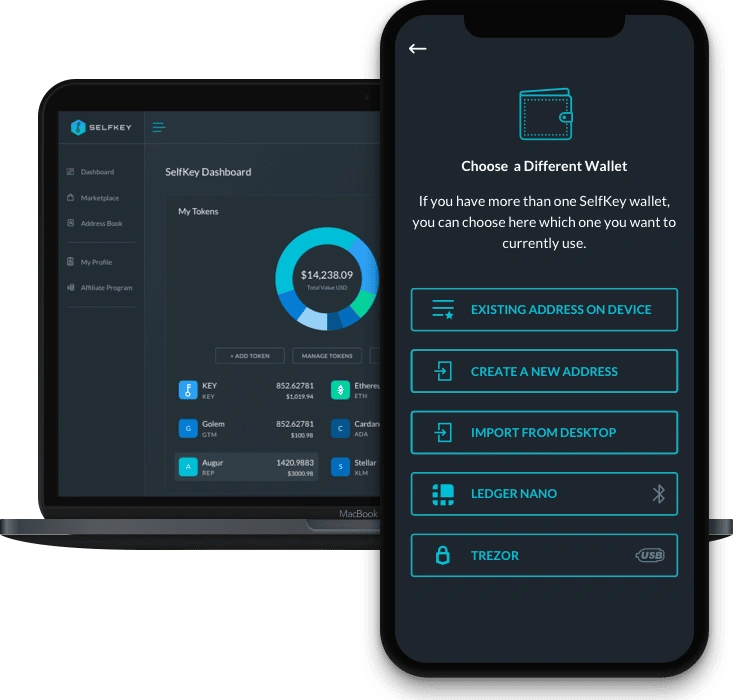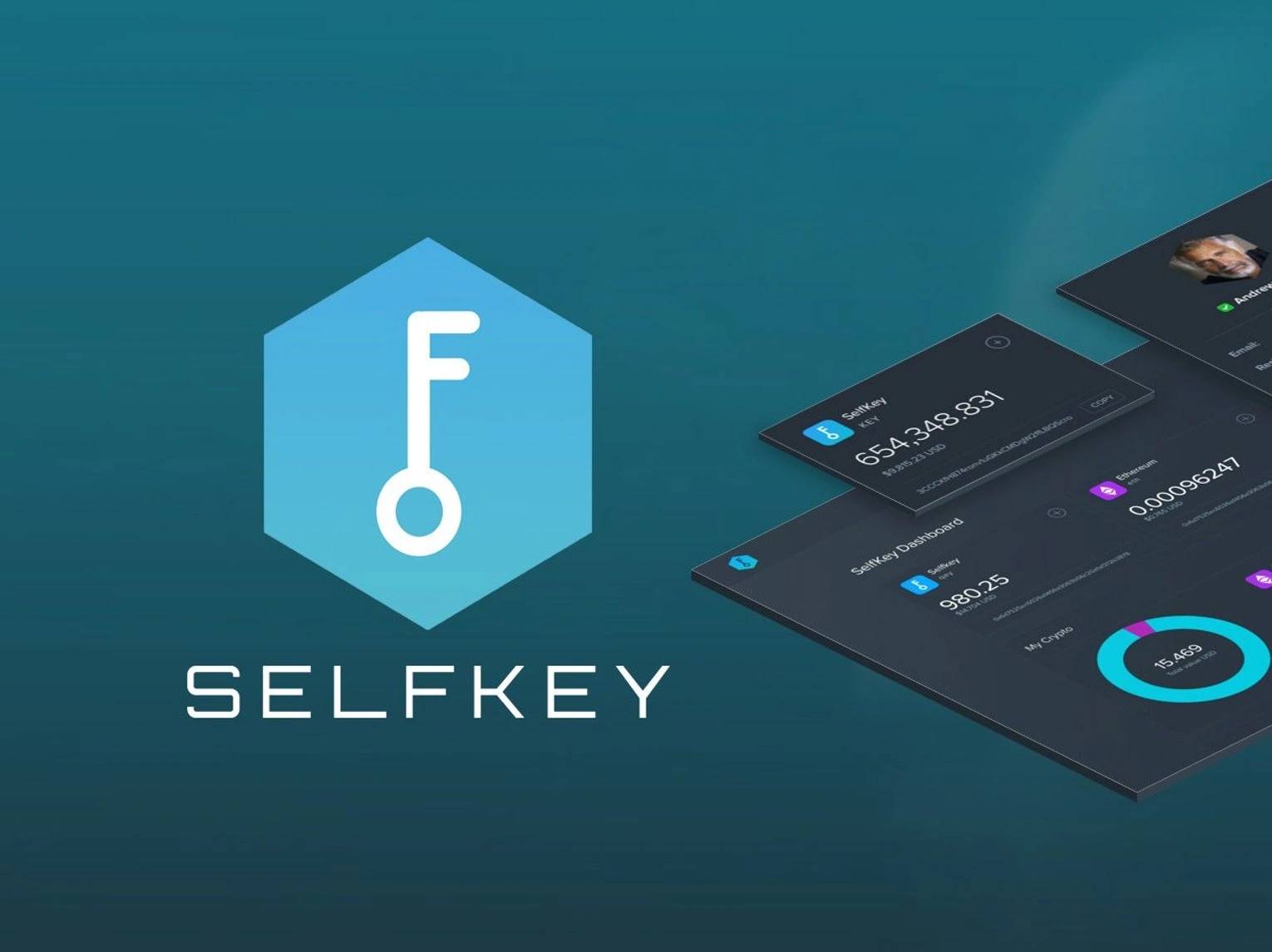Subscribe to wiki
Share wiki
Bookmark
SelfKey
We've just announced IQ AI.
SelfKey
SelfKey is a decentralized identity network, founded to safeguard personal data by implementing an open-source, decentralized digital identity protocol. In this decentralized ecosystem, the SelfKey Protocol is powered by their utility token, KEY, and overseen by a decentralized autonomous organization (DAO) governed by SelfKey iD Holders. This aims to promote digital sovereignty within Web3 and the Metaverse, offering individuals full control over their data, documents, and digital assets, enhancing censorship resistance and security. [1][4]
Overview
Established in 2017, SelfKey is a emerging blockchain-based DAO developing digital identity solutions. With a core focus on advancing identity and personal information, the DAO aims to enable both individuals and corporations to claim control and ownership of their identity data. SelfKey utilizes blockchain technology in order to move away from centralized databases with the goal of enhancing safety measures for the protection of personal data and privacy. [2][3][5]
Key Components
KEY Token
The KEY token is an Ethereum-based ERC-20 token that plays a key role within the SelfKey Network. It is utilized for access rights and as a means of establishing proof of reputation in the SelfKey Ecosystem. The KEY token operates as a trust mechanism, enabling users to exchange value and participate effectively within the ecosystem. [8]
Key Features
Trust and Reputation
Key Token leverages smart contract technology to introduce mechanisms designed to overcome potential threats that could undermine the confidence placed in the SelfKey Identity System. [9]
Proof of Reputational Stake
In order to access the network, Identity Owners are required to stake KEY tokens in a locked smart contract. These staked tokens are automatically released when the identity owner decides to leave the SelfKey Ecosystem. This staking of KEY tokens serves as a Sybil-attack prevention mechanism, deterring bad actors from creating multiple false or stolen identities to gain undue influence within the ecosystem. Any malicious actor attempting to manipulate the network must stake a certain amount of KEY for each identity they create, and if detected, they face a loss as they cannot recover the staked tokens. [10]
Bonded Notaries
Within the SelfKey Ecosystem, professionals such as lawyers, notaries, accountants, consulates, and governmental authorities can become certifiers. To achieve this status, eligible individuals must lock a specific amount of KEY tokens in a smart contract, similar to how traditional notaries post surety bonds. This ensures that certifiers remain accountable for their actions. If a certifier makes an incorrect attestation, they forfeit the tokens locked in the contract to the relying party affected by the incorrect attestation. This bonded notary system assigns weight and value to attestations, encouraging good practices and providing compensation to harmed relying parties. Certifiers must also adhere to the terms and conditions established by the SelfKey Foundation, and non-compliance puts their staked tokens at risk. [11]
Trust Framework
Identity Owners place trust in relying parties who access their data and identity documents to provide products and services. The KEY Token serves as a mechanism to incentivize relying parties to adhere to this trust framework. Relying parties are obligated to lock KEY tokens in a smart contract to offer their services within the SelfKey Marketplace. If a relying party breaches this trust by misusing identity data, they incur a loss of tokens locked in the contract, representing an unrecoverable economic setback. This system ensures that the trust framework is upheld and that relying parties act responsibly in handling identity data within the ecosystem. [12]
Identity Wallet
The SelfKey Wallet leverages blockchain technology to establish a robust identity platform, offering individuals the means to manage their personal information. This wallet allows users to select the data they wish to disclose, specify who can access it, and for how long, fundamentally transforming the way they engage with the digital realm. [6]
Key Features
- Protection through Self-Sovereign Identity: The SelfKey Wallet empowers users to safeguard their personal data, shielding it from potential threats posed by malicious actors.
- Reclaim Data Ownership: SelfKey enables individuals to reclaim ownership of their data and allows users to manage when and with whom they share their personal information.
- Secure Access to ID Assets: The wallet facilitates secure access to identity assets and documents, which can be verified and notarized through qualified certifiers. These can then be shared with relying parties within the SelfKey Marketplace, enabling quick access to various products and services.
- Cryptocurrency Portfolio Management: The SelfKey Wallet is not limited to identity management; users can send and receive Ethereum (ETH), SelfKey tokens (KEY), and other ERC-20 tokens. The wallet also integrates with Ledger Nano S Hardware Wallet and JSON Keystore files for enhanced security and ease of use.
- Efficient Identity Management: Users can create their SelfKey ID, inputting personal details and KYC documents such as passports, ID cards, driver's licenses, proof of address, and selfies.
- Local Data Storage: All data and documents are stored locally on the user's device, ensuring that neither SelfKey nor any other party has access to this information without the user's explicit consent.
- Access to SelfKey Marketplace: Besides managing ERC-20 tokens, the Wallet provides access to the SelfKey Marketplace. This service hub offers incorporation services, cryptocurrency exchanges, bank accounts, and more. Notably, the Incorporations Marketplace, launched in March 2019, facilitates the opening of businesses, with the option to pay using KEY tokens.
SelfKey Marketplace
The SelfKey Marketplace, integrated into the SelfKey Wallet, offers an array of financial, corporate, immigration, and cryptocurrency-related services. The marketplace, distributed across more than 10 market verticals, provides swift access to an extensive range of offerings, and its supported integrations are continuously expanding. [13][16]
The SelfKey Marketplace provides technical support for integration, facilitating the incorporation of the marketplace into existing systems through the SelfKey API gateway. Customers without an existing KYC solution can utilize Quick-KYC by KYC-Chain. Requirements gathering includes verification of exchange listing information, KYC solution selection, KYC document requirements, and KYC policy considerations. [16][17]
Key Features
- Efficient Business Setup: For those looking to establish businesses abroad, the SelfKey Marketplace streamlines the process, allowing users to research, prepare, and open companies in over 12 offshore jurisdictions. Crucial information such as formation time, required documents, tax rates, shareholder structure, and reporting details are readily available. Payments for these services can be made in KEY tokens and are priced against the USD.
- Time and Document Efficiency: Users can use their SelfKey ID to save time and minimize the back-and-forth communications often required when applying for services that demand Know Your Customer (KYC) compliance.
- International Banking Made Easier: For individuals or businesses operating outside their country of residence, obtaining an offshore bank account offers financial advantages, reducing costs associated with currency conversions. The SelfKey Marketplace provides a choice of over 20 jurisdictions for opening international bank accounts.
Current Integrations
Exchanges
The SelfKey Marketplace simplifies the process of trading digital assets by enabling users to compare exchange accounts and instantly sign up for a verified account without waiting or trading limits. Users can filter options based on criteria such as supported countries, fiat currencies, cryptocurrencies, fees, trading choices, languages, and device and OS compatibility. [14][16]
Incorporations
The marketplace guides users in selecting the optimal jurisdiction for their business setup, offering insights into legal requirements and tax structures for various entity types across jurisdictions. Users can filter options based on factors like corporate ownership, minimum shareholders, accounting demands, privacy provisions, tax rates, offshore tax regulations, anti-avoidance rules, and tax treaties. [15][16]
SelfKey Extension
The SelfKey Extension serves a dual role by creating a user-friendly interface and establishing a vital communication bridge between the SelfKey Identity Wallet (IDW) and the LWS server integration. This extension enables users to interact directly with various related components through their browser window. In its current configuration, the SelfKey Extension facilitates the selection of available wallet addresses and the remote unlocking of these wallets using either a password or keystore file. Simultaneously, it enables users to choose a wallet for authentication through LWS, directing the IDW to provide the requested data and documents to the server integration. [18]
The SelfKey Extension is built as a React application that relies on port messaging to communicate with extension content.js and background.js scripts. The content.js script serves as the liaison with the LWS Client Library, while the background.js script establishes a secure Websocket connection with the SelfKey Identity Wallet. [18]
Mobile Wallet
The SelfKey Mobile Wallet provides a user-friendly solution for the management of ERC-20 tokens on mobile devices. This approach ensures that users maintain complete control over their cryptocurrency assets, reducing reliance on third-party exchanges. [19]

Key Features
- Global Accessibility: The SelfKey Mobile Wallet empowers users to manage their ERC-20 tokens from anywhere in the world. It's compatible with both Android and iOS devices, providing flexibility and accessibility to users on various platforms.
- Send and Receive Tokens: Users can easily send and receive ERC-20 tokens directly from their mobile devices, facilitating seamless transactions and asset management.
- Visual Dashboard: The wallet provides a visual dashboard that offers a clear overview of your token portfolio, enhancing user convenience and ensuring transparency.
- Secure Backups: The SelfKey Mobile Wallet offers straightforward backup options, reinforcing the safety of your cryptocurrency holdings.
- Import Desktop Wallet: Users can import their desktop wallet onto the mobile device, granting visibility over their token portfolio, including a visual dashboard displaying all ERC-20 tokens.
- Download and Add Tokens: The wallet can be downloaded for free on both iOS and Android devices. Users can easily add various ERC-20 tokens, including KEY, ETH, and MKR, to their SelfKey Mobile Wallet, expanding their cryptocurrency management capabilities.
- Send and Receive Transactions: The SelfKey Mobile Wallet facilitates sending and receiving of digital assets worldwide, enhancing the utility and accessibility of your cryptocurrency holdings.
See something wrong?
